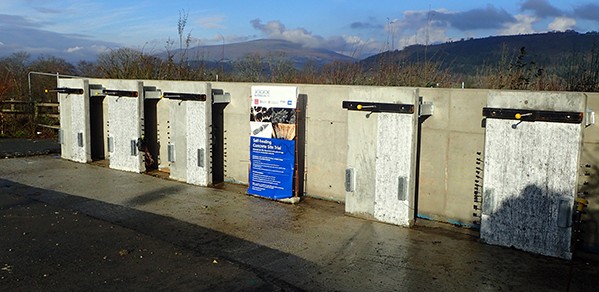
Cambridge collaborative research into the development of self-healing cement-based materials for infrastructure has received a £4.85million funding boost from the Engineering and Physical Sciences Research Council (EPSRC).
I’m delighted that the hard work over the past 18 months has paid off and I’m looking forward to addressing the challenges we have set ourselves over the next five years. These have been established in order to cause a step-change in the value placed on infrastructure materials and to provide a much higher level of confidence and reliability in the performance of our infrastructure systems.
Professor Al-Tabbaa
Abir Al-Tabbaa, Professor of Civil and Environmental Engineering, said the newly funded Resilient Materials 4 Life (RM4L) programme grant – announced by Science Minister, Jo Johnson – will build on the success of the existing Materials for Life (M4L) project, also funded by the EPSRC. Professor Al-Tabbaa leads the Cambridge research team collaborating with Cardiff University, the University of Bath and now the University of Bradford, as well as a large number of industry partners, with contributions of over £2million.
The programme grant RM4L will enable the team to address a number of large and significant challenges and make major advances in the realisation of intelligent infrastructure materials. Challenges include the tailoring, modelling and optimisation of the developed self-healing systems for targeted applications, which include precast slabs, repair systems, tunnel linings, basements and marine renewables.
M4L was funded from the EPSRC Ground and Structural Engineering Challenge call in 2012 following the funding of two networks: Future Infrastructure Forum (FIF) and Low Impact Materials and Innovative Engineering Solutions for the Built Environment (LimesNet). M4L developed for the first time a suite of self-healing infrastructure materials and systems using a combination of microcapsules, bacteria, shape memory polymers and vascular networks to address multi-scale physical damage in cementitious infrastructure systems.
The project culminated with the construction of the first-ever field trials application of self-healing concrete in the UK using the developed systems. This was facilitated by Costain, the lead project industry partner, on the A465 Heads of the Valleys £200m road upgrade scheme in Wales. The trials involved the construction of five retaining walls in September 2015, in which different combinations of the developed self-healing systems were embedded, together with a control panel. The walls were then subjected to damage and allowed to subsequently heal under a range of curing environments. The response of these panels in both pre- and post-healed conditions is being monitored with a range of in-situ instrumentation and visualisation techniques.
“The results obtained to date from M4L are highly promising,” said Professor Al-Tabbaa. “The M4L project has also placed the UK firmly as a leader in the global arena with core representation on the new EU COST Action – SARCOS: Self-healing As preventative Repair of COncrete Structures and the RILEM TC SHE: Self-healing concrete – its efficiency and evaluation.”
The concept of developing biomimetic self-healing infrastructure materials has captured the imagination of the public and government alike and has led to a large number of outreach activities, publicity and recognition awards. Highlights have included numerous radio and TV interviews, the IdeasLab talk at the 2016 World Economic Forum and winning the ‘You Heard it Here First’ session at the 2013 National Science Festival when it was voted as ‘the research most likely to change the world’.
Costain won two prestigious awards for its contribution to the project (FIATECH Celebration of Technology Innovation Award 2014 and the first NCE100 Companies of the Year Awards 2016). Contributions at Science Festivals, local science events and collaboration with a local artist are also making a significant impact on the public. The Government Technology and Innovation Futures 2017 report has recently identified the use of self-healing materials as potential vehicles for self-repair in future smart roads.
Speaking about the RM4L project, Professor Al-Tabbaa said: “I’m delighted that the hard work over the past 18 months, with the three-stage programme grant application process and two interviews, has paid off and I’m looking forward to addressing the challenges we have set ourselves over the next five years. These have been established in order to cause a step-change in the value placed on infrastructure materials and to provide a much higher level of confidence and reliability in the performance of our infrastructure systems.
“The scaling-up of developed systems is among the major challenges the RM4L will address with industry partners. Another major challenge will be to address complex and diverse damage scenarios including cyclic damage, time-related damage and chemical damage. The programme grant will tackle the challenge of equipping those self-healing systems with the capabilities of self-sensing, self-diagnosing and self-immunisation in order for it to anticipate damage and respond accordingly. It will do this by strengthening the defence mechanism against the damage or minimising the impact. A large number of innovative potential solutions and concepts have been proposed and the most promising of those will be taken forward.”
Speaking on the day of the funding announcement, Science Minister, Jo Johnson said: "The Resilient Materials 4 Life project is a great example of research being used to find solutions and improve ways of working.
"Through our Industrial Strategy and our record investment of £4.7billion for research and development, we will continue to support projects like this, ensuring the UK remains at the forefront of innovation for years to come."
Professor Philip Nelson, Chief Executive of EPSRC, added: "Resilient Materials 4 Life has the potential to revolutionise the way our infrastructure copes with long-term wear and tear and reduce costs significantly.
"Moreover, as part of EPSRC's continuing support for world-leading research in this vital field it will help, through the upgrading of the nation's infrastructure, to keep the UK a prosperous and resilient nation."

